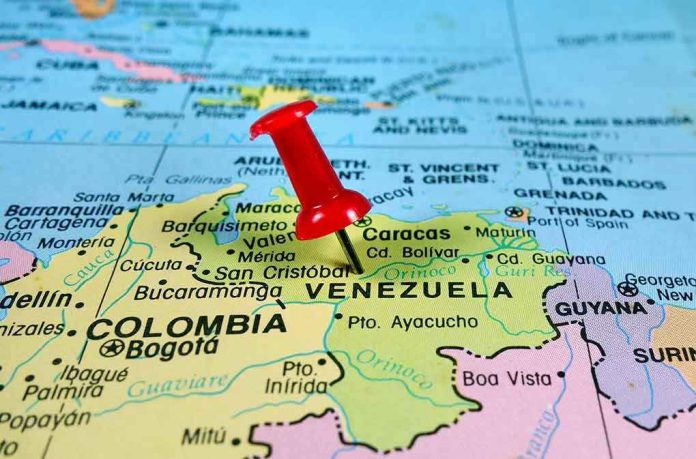
A new U.S. military strategy against Venezuelan drug cartels intensifies, raising concerns over sovereignty and international law.
Story Snapshot
- Trump administration targets Venezuelan drug cartels as terrorists, justifying military strikes.
- U.S. military strikes in the Caribbean result in 21 deaths, sparking international controversy.
- Venezuela accuses the U.S. of violating sovereignty, leading to a U.N. Security Council meeting.
- U.S. stance emphasizes self-defense and regional stability against narcoterrorism threats.
U.S. Military Escalation in the Caribbean
The Trump administration has launched an aggressive military strategy aimed at Venezuelan drug cartels, labeling them as terrorist organizations. This policy shift led to recent U.S. military strikes on vessels in the Caribbean, reportedly resulting in 21 fatalities. These actions are justified by the administration as necessary measures for self-defense and to maintain regional stability. However, Venezuela and its allies have accused the U.S. of violating sovereignty and escalating towards armed conflict, bringing the issue to the U.N. Security Council.
In early October 2025, the U.S. military conducted strikes on four boats in the Caribbean, a move described by Trump officials as part of a counter-narcoterrorism operation. The administration’s hardline approach was reinforced by U.S. Ambassador to the U.N., Mike Waltz, absent at the U.N. meeting but echoed by John Kelley, who reiterated the U.S. position. These developments have intensified diplomatic tensions, with Venezuela seeking international condemnation of the U.S. actions.
Historical Context of U.S.-Venezuela Strains
Relations between the U.S. and Venezuela have been strained since the leadership of Hugo Chávez and Nicolás Maduro, characterized by allegations of Venezuela harboring drug cartels. The Trump administration’s refusal to recognize Maduro’s government and its support for opposition figures like Maria Corina Machado have further strained ties. The recent military actions are the latest in a series of U.S. policies aimed at undermining the Maduro regime and supporting regime change in Venezuela.
This strategy also comes amid heightened U.S. military presence in the Caribbean, with the U.S. framing the conflict as a “non-international armed conflict” against terrorist organizations. The Nobel Peace Prize awarded to opposition leader Machado has added a political dimension, aligning her with U.S. policy and increasing international attention on the situation.
International and Domestic Reactions
The U.N. Security Council has become the primary venue for addressing the legality and impact of these military actions, with Russia and China supporting Venezuela’s calls for de-escalation. Most other nations urge restraint, highlighting the risks of further destabilization in the region. The Trump administration remains resolute in its actions, citing the necessity of combating narcoterrorism to protect U.S. interests and regional security.
Trump will do ‘whatever it takes’ to defend US from Venezuela’s terrorist drug gangs: Mike Waltz https://t.co/N19BeIt4YR pic.twitter.com/QbEZFpmMt2
— New York Post (@nypost) October 16, 2025
Domestically, the actions have sparked debate over the potential implications for U.S. foreign policy and defense strategies. Critics argue that the strikes risk broader conflict and violate international law, while supporters claim they are a necessary response to the threat posed by drug cartels. The U.S. continues to support opposition leaders and calls for regime change in Venezuela, demonstrating a commitment to aggressive anti-cartel operations despite the diplomatic fallout.
Sources:
US clashes with Venezuela and allies at emergency UN meeting on US strikes in Caribbean
Trump speaks with Venezuela’s Machado after her Nobel Peace Prize win
White House disapproves of Machado’s Nobel but Rubio is a big supporter
Nobel Peace Laureate calls for U.S. bombing of her country


